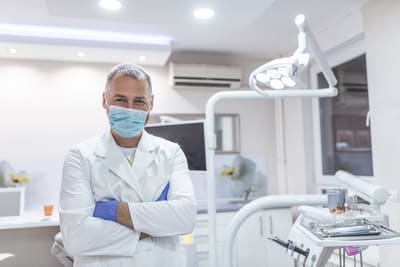
I am here to challenge some of the more entrenched belief systems pertaining to dentistry – precepts often rooted in misconceptions, their validity in tatters and their consequences dire, but which nevertheless remain fixed in the minds of great dentist around the world.
Dental Myth #1: Selling dentistry is a dirty act
Dr David Decent is proud of the fact that he’s a clinician, not a salesman. He wears a crisp white sterile gown and speaks in an eloquent and measured way. He is highly respected among his peers and well trusted by his patients. He educates his patients with a list of standard options available for treating various problems; part of his role as a caregiver is to pass on information. In order to educate patients about dental disease, he emphasises the perils of inaction. His loyal nurse of 12 years standing celebrates each of his birthdays with a poster she had made from a picture of him next to his brand-new sky-blue dental chair. It reads “Happy Birthday Dr Decent”.
Dr Decent applies himself clinically, keeps abreast of most new technology and remains vigilant with ongoing education. He declines to be distracted by how many of his new patients reschedule for further appointments, how many of his treatment plans convert to completion, how many of his recalls return in six months and what proportion of his patients opt for better treatment modalities versus the universally accepted inferior options.
Dr Claire Closer (pronounced “Clozer”), on the other hand, loves to sell. She lives for the thrill of closing a deal. She brings personality to her profession and speaks with passion about ideal treatment options. She is comfortable discussing money matters, large or small, because she has an underlying core belief that good medicine is not cheap. The language she uses adds colour to the dry subject of certain treatment modalities. She has a high energy level that is palpable throughout the corridors of her practice – a practice that has been designed as an extension of her personality. She is loved by her patients, who all know her by her nickname “Claire Bear”. A well-worn smiling teddy sits in the corner of her waiting room whispering soothing messages to nervous children.
Dr Closer embraces technology. Her digital OPG machine has changed her entire approach to the sequence and presentation of a treatment plan consultation. Her chair side CAD/CAM system has changed the way she practices. She is always gaining more experience clinically in challenging and interesting cases, as there seems to be so much demand for them. She analyses her success through conversion rates of new patients, treatment plan completions, staff retention rates and the quality of chocolates she receives as gifts from her long list of satisfied patients. She has never extracted any teeth that were salvageable, she has not made a partial denture in years and many of her cosmetically driven patients are currently having Invisalign and teeth whitening instead of porcelain veneers.
Now, as a practice owner, I wonder which of these clinicians you would like to have working for you? As a dental assistant or practice manager, which of these clinicians would you rather work for? And as a patient, who would you rather have treating you?
I can hear the cogs in your brains working overtime. Of course you are all thinking “I’d prefer whichever one is the better dentist, not the better salesperson”. But stop there; hold back with the belief systems. If you’re fair dinkum about preferring the better dentist, let’s delve deeper into what makes either candidate just that: the better dentist.
Dr Closer is always improving her overall conversion rates on various parameters from the moment a patient seeking comprehensive care picks up the telephone to schedule an appointment…
• Mentoring all ancillary staff in communication skills;
• Installation of sound practice-management systems;
• First impressions of practice, ancillaries and primary carer;
• Listening skills and tuning into patients’ motivations and expectations;
• Discussing treatment options, managing the budgetary concerns, allaying various fears – all leading to modality choices consistent with good or preferably ideal medicine;
• High standard of clinical competence resulting in sound dentistry within the framework of a strong and empathic relationship; and
• Ongoing self-assessment of success rates of various non-financial parameters to keep improving.
Dr Closer will argue that her drive and motivation in wanting to improve her overall levels of patient acceptance and various conversion rates are threefold.
Firstly, in most instances, when there is a choice between a favourable treatment modality and an unfavourable one, the clinician plays a critical role and in fact has a duty of care or an onus of obligation in directing, inspiring and motivating a patient to choose what is accepted universally as better oral health.
Examples of this include, but are certainly not limited to endodontics over extraction of salvageable teeth; dental implants over dentures or missing teeth; orthodontics over invasive cosmetic dentistry; porcelain over resin; regular hygiene over complacency; and restoration over piecemeal rehabilitation over degradation.
Secondly, every patient that is lost at any stage in the process is now potentially exposed to harm. This harm may be by way of further self-neglect or at the hands of a clinician Dr Closer would consider clinically inferior to herself.
Thirdly, the path of good medicine is always better both physically and financially for the patient in the long-term, but unfortunately it is often more expensive in the short-term.
The benefit this additional expense brings is the injection of additional funds into the business. This can be in the form of better skilled ancillaries, improved equipment, enhanced technology and an overall better dental practice. At least in Dr Closer’s case, the all-ceramic crowns and single visit porcelain inlays Johnny is paying for will be making for a better dental practice from which Johnny, his wife and two kids will benefit for many years to come.
Still unsure as to who is the better dentist?
It has always been my opinion that dentists have an unwritten obligation to their patients to improve their communication skills, maintain their passion for good medicine and place focus on their various conversion rate indicators to keep improving as an overall care provider. Dr Closer, as a good salesperson and advocate of ideal dental care, is a flag-bearer among dentists in providing good medicine, just like Dr Decent. It’s just that Dr Closer will inspire more patients to want it. I want Dr Closer in my team and as my personal and family dentist!

